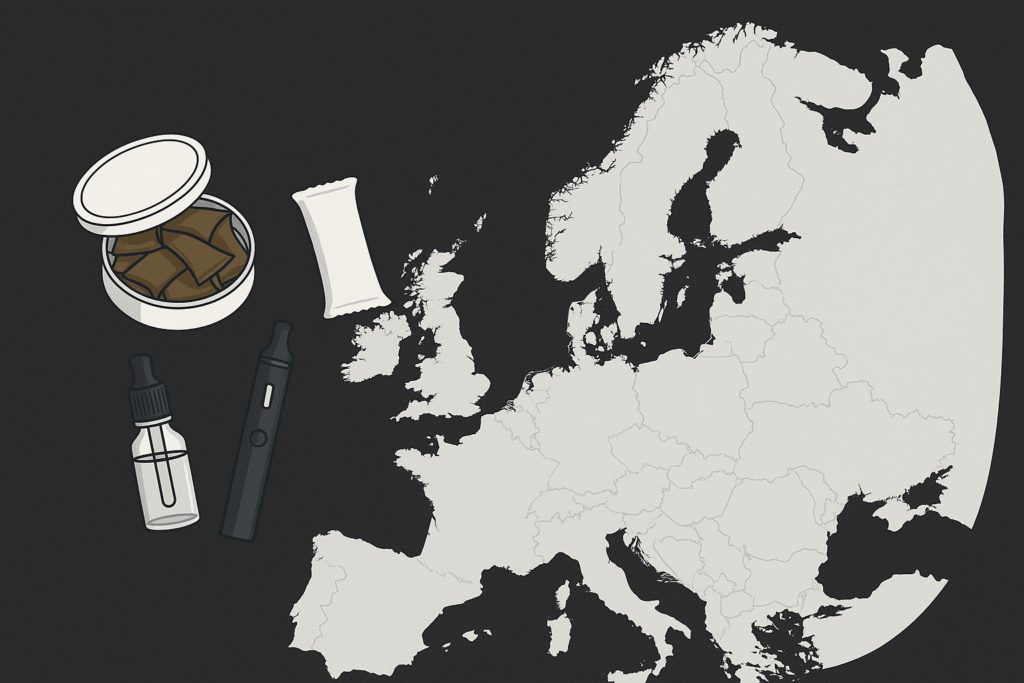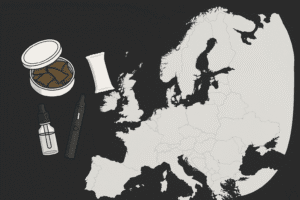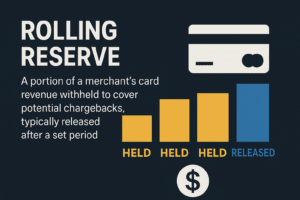Snus and Vape in Europe: Legal Status, and Requirements
The European nicotine market is growing quickly, but so are the regulations that govern it. Snus is banned across the European Union except in Sweden. Nicotine pouches are treated differently in almost every member state. Vaping is legal everywhere but governed by detailed compliance rules that vary from one jurisdiction to another. For merchants, distributors and payment providers, the complexity of this landscape makes clear compliance frameworks essential.
This guide breaks down how each product category is regulated, where it can be sold and what merchants must know before entering the market. It also offers a practical view of onboarding requirements and payment risk, helping both merchants and PSPs operate with clarity and confidence.
Understanding the Core Product Categories
The European market divides alternative nicotine products into three major categories. While they might look similar to consumers, regulators treat them entirely differently. This is why merchants must classify products correctly before onboarding or selling.
Snus is a smokeless oral tobacco product that originated in Sweden. Because it contains tobacco and is placed under the lip, it falls under the EU definition of tobacco for oral use. The EU prohibits this category altogether, and the only country exempt is Sweden. Snus can also be sold in Norway, which is not an EU member and follows its own national rules. Everywhere else, snus is prohibited.
Nicotine pouches look like snus but contain no tobacco. This places them outside the Tobacco Products Directive. With no EU-wide framework, each country creates its own rules. Some allow them, some restrict them and others ban them completely. This category is the most fragmented and unpredictable part of the European nicotine market.
Vaping products are regulated under the Tobacco Products Directive. This provides a unified baseline for nicotine strength, tank capacity, bottle size, packaging and warning labels. While vaping is legal everywhere in the EU, national governments often add their own rules, such as flavour restrictions, public use laws or excise taxes. Merchants selling vape products must understand both the EU rules and the national additions.
The Regulatory System Behind Europe’s Nicotine Laws
Europe uses a layered regulatory approach. Some rules come from the European Union itself, while others are created by national governments.
The Tobacco Products Directive governs vaping and creates consistent requirements across the region. Once a vaping product goes through the TPD submission process, it can be offered in all EU member states, provided the merchant respects national sales rules. The directive limits nicotine strength, regulates refill containers, requires child resistant packaging and mandates health warnings.
Snus falls under a separate classification as tobacco for oral use. This category is banned across the EU due to an older piece of legislation that has not been modernised. Sweden is the only exception, and that exception exists due to its EU accession agreement. Outside Sweden and non EU Norway, snus remains illegal.
Nicotine pouches are not included in the directive because they contain no tobacco. This leaves a regulatory gap. Countries fill that gap differently, which is why laws differ so dramatically between Belgium, France, Germany, Sweden and other member states.
A few countries view nicotine pouches as lower risk alternatives. Others classify them as unsafe due to youth adoption. Several treat them as food or medicinal products, which blocks legal sale. Each approach creates different obligations for merchants.
Where Snus Is Legal and Why It Is Restricted Elsewhere
Snus can be legally sold only in Sweden within the European Union. Sweden secured this right due to cultural and historical significance. No other EU country holds this exemption. Norway, which is outside the EU, also permits snus under national rules. Every other EU member state prohibits the sale of snus entirely.
| Country | Snus Status |
|---|---|
| Sweden | Allowed |
| Norway (non EU) | Allowed under national law |
| All other EU countries | Prohibited |
Merchants must restrict snus to Sweden and Norway. Any attempt to sell or ship snus to consumers in other EU countries exposes both merchants and PSPs to legal and regulatory risk.
Where Vaping Is Legal in Europe
Vaping is legal in all EU countries, but it is closely regulated. Merchants must comply with the Tobacco Products Directive before offering vape products to consumers.
The directive requires clear warning labels, child resistant packaging, tamper resistant containers, ingredient disclosure, nicotine clarity and tank and bottle size limits. It also requires product submissions before placing items on the market. Once approved, the products can be sold across the EU, but national governments may still apply additional requirements.
Countries differ significantly in how they handle flavour restrictions, retail rules, taxation and environmental considerations. Belgium has taken the extra step of banning disposable vapes entirely, and other countries are considering similar moves. This means merchants must keep track of how member states interpret or extend the TPD.
The Legal Status of Nicotine Pouches Across Europe
Nicotine pouches are the most inconsistent and challenging category because no EU-wide law governs them. Each member state has created its own approach. Some countries, such as Sweden and Italy, allow nicotine pouches with moderate controls. Others, such as Belgium, France and the Netherlands, have chosen to ban them entirely. Countries like Germany have taken a regulatory approach where classification under food safety rules prevents lawful sale.
For merchants, this means every country must be evaluated individually. A product that is fully compliant in Sweden might be illegal in France. A merchant shipping nicotine pouches across borders must ensure that offers, targeting and distribution respect national rules.
Full EU Country by Country Overview
This table summarises the status of vaping and nicotine pouches across Europe.
| Country | Vaping Status | Nicotine Pouches | Notes |
|---|---|---|---|
| Austria | Legal | Allowed or regulated | NPs permitted with labelling and age rules. |
| Belgium | Legal, disposable vapes banned | Banned | Full prohibition on NPs and disposables. |
| Bulgaria | Legal | Allowed or regulated | NPs allowed with warnings. |
| Croatia | Legal | Allowed or regulated | Consumer safety rules apply. |
| Cyprus | Legal | Allowed or regulated | Sold as general consumer products. |
| Czechia | Legal | Restricted or partial | Tightened rules on nicotine and marketing. |
| Denmark | Legal with strict marketing rules | Restricted or partial | Strong controls on flavours and packaging. |
| Estonia | Legal | Restricted or partial | High restrictions for alternative nicotine. |
| Finland | Legal | Restricted or partial | Some NP rules approach medicinal standards. |
| France | Legal | Banned from 2026 | Full ban confirmed. |
| Germany | Legal | Restricted or partial or de facto banned | Novel food classification blocks sale. |
| Greece | Legal | Allowed or regulated | Access controlled by age limits. |
| Hungary | Legal | Restricted or partial | NPs limited by centralised tobacco laws. |
| Ireland | Legal | Allowed or regulated | NPs permitted with controls. |
| Italy | Legal and taxed | Allowed or regulated | Both categories fall under excise frameworks. |
| Latvia | Legal | Restricted or partial | Significant limits on availability. |
| Lithuania | Legal | Allowed or regulated | Flavour bans apply to vaping. |
| Luxembourg | Legal | Banned or near banned | One of the most restrictive NP markets. |
| Malta | Legal | Allowed or regulated | NPs legal with strict age rules. |
| Netherlands | Legal | Banned | Full NP ban active. |
| Poland | Legal | Allowed or regulated | NPs require packaging compliance. |
| Portugal | Legal | Allowed or regulated | Based on general consumer protection. |
| Romania | Legal | Allowed or regulated | Age and packaging rules apply. |
| Slovakia | Legal | Allowed or regulated | NPs allowed with safety oversight. |
| Slovenia | Legal | Allowed or regulated | NPs allowed under tobacco aligned law. |
| Spain | Legal | Restricted or partial | Consistent tightening of NP rules. |
| Sweden | Legal | Allowed or regulated | Largest NP and snus market. |
Payment Processing Considerations for Snus, Vape and Nicotine Pouch Merchants
Payment processing in the nicotine sector is its own regulatory environment. The product might be compliant, but if the payment flow or country targeting is not, both the merchant and the acquirer face immediate exposure. Snus, nicotine pouches and vaping products each carry their own risk profile, and acquirers examine them closely before giving approval.
The first challenge is the legal landscape itself. Snus is restricted to Sweden, so PSPs will only support merchants who operate within Sweden’s borders or Norwegian rules for non EU commerce. Any attempt to sell snus cross border makes processing impossible. Nicotine pouches create a different challenge. Their legality changes dramatically between countries, which requires merchants to demonstrate precise control over where products are marketed, shipped and displayed. Vaping products are the most straightforward from a legal standpoint, but they demand verifiable compliance.
Age restriction is another major factor for acquirers. All nicotine products require reliable age validation. Merchants who rely on weak or outdated methods are considered higher risk and often face higher fees, delayed settlements or complete rejection. Acquirers must be confident that the merchant does not allow underage purchases, especially for distance sales.
Where things become more technical is in underwriting. Acquirers review product types, website structure, shipping destinations, packaging compliance, and country blocking. They look at how merchants describe their products and whether marketing claims could mislead consumers or regulators. They also examine how confident a merchant is about its own supply chain, packaging accuracy and geography rules. This is especially important for nicotine pouches, since France, Belgium and the Netherlands have full prohibitions in place.
What acquirers usually expect from merchants
Accurate product categorisation for snus, nicotine pouches and vape
Evidence that restricted countries are blocked at checkout
Clear photos and documentation of packaging and warning labels
Active age verification for all sales channels
Beyond this list, the most important requirement is proof that the merchant truly understands where they can and cannot sell their products. Nothing creates more exposure for a PSP than a merchant who targets jurisdictions where their products are banned.
Snus merchants face the tightest restrictions. PSPs will only process if the merchant operates entirely within Sweden or, where relevant, Norway. The merchant must show that targeting, marketing and shipping are limited to those countries. Any deviation immediately disqualifies processing.
Nicotine pouch sellers face the most complex onboarding. They must show strong geographical controls, compliance statements for each market and correct classification of every product they sell. Since several EU countries prohibit nicotine pouches entirely, acquirers will not support merchants who ignore or sidestep these boundaries.
Vape merchants, while operating within a more predictable category, must still demonstrate that their products have completed TPD notifications and that their packaging aligns with both EU and national rules. Merchants selling disposables must show awareness of national bans, such as the one in Belgium.
Where FastoPayments stands out is in helping merchants navigate these rules before onboarding. We guide merchants through country restrictions, product classification, packaging compliance and risk-reduction strategies. Our underwriting process is built to support legitimate operators who follow the law, maintain strong age verification and respect national boundaries. For merchants who meet these standards, we offer stable processing, compliance-backed support and a clear framework for international scale.
Why European Regulations Differ
Europe’s regulatory differences stem from legal history, product classification and national health policy. The EU ban on oral tobacco dates back to an era before modern alternatives emerged. Sweden’s exemption reflects cultural continuity rather than regulatory flexibility. Nicotine pouches developed years after the TPD came into force, and no update has added them to EU law. With no harmonised category, countries made their own decisions.
Public health strategies also influence these differences. Some countries prioritise harm reduction. Others prioritise strict nicotine control. This creates sharp divergence between permissive markets like Sweden and restrictive markets like Belgium or France.
Merchant Compliance Responsibilities
Merchants selling nicotine products in Europe must approach the market with discipline. Proper product classification is essential. Snus cannot be marketed outside Sweden and Norway. Nicotine pouches must be targeted only to countries where they are legal. Vaping products must be registered, labelled correctly and packaged according to EU standards.
Age verification is required across all nicotine categories. Packaging must include warnings in local languages. Cross border sales must respect country specific restrictions. Merchants must be prepared to demonstrate compliance with product submissions, supply chain transparency and distribution controls. PSPs will ask for this documentation during onboarding.
How PSPs View These Categories
Payment providers consider nicotine products a high touch vertical. The risk comes not only from regulatory restrictions but also from potentially misleading product descriptions, weak age verification or cross border delivery into restricted jurisdictions. PSPs must verify country targeting, product legality, packaging compliance and operational safeguards before approving a merchant.
Transactions involving banned products create exposure across multiple regulatory layers. This is why PSPs expect clear KYC documentation, category declarations and product proof. Merchants that demonstrate compliance reduce onboarding friction and long term risk.
Merchant Onboarding Guidance
Before launching sales in Europe, merchants should establish a clear understanding of which products they carry and where they plan to ship them. Snus should be limited to Sweden and Norway. Nicotine pouch availability must be checked country by country. Vape products must be registered through the TPD process and must be packaged according to EU rules.
A strong age verification solution is required for all online sales. Packaging, labelling and health warnings must be reviewed before import or shipment. Merchants must keep documentation for product submissions and compliance certificates. Monitoring national law changes is essential, especially for nicotine pouches and disposable vapes.
Frequently Asked Questions
Is vaping legal in all EU countries
Yes, vaping is legal across the entire EU but subject to strict rules under the Tobacco Products Directive.
Why is snus only legal in Sweden
Because the EU prohibits tobacco for oral use, and Sweden secured a unique exemption when joining the EU.
Are nicotine pouches banned in France and the Netherlands
Yes. France has adopted a full ban that will be enforced in 2026. The Netherlands already prohibits them.
Can snus be shipped across the EU
No. Snus cannot be sold to customers in any EU country except Sweden.
Are disposable vapes banned in Europe
Belgium has banned disposable vapes, and other countries are reviewing similar measures.
Are nicotine pouches regulated at EU level
No. Each country sets its own rules.
Your Next Move
Europe offers strong commercial potential for nicotine merchants, but success requires precision and compliance. Snus is restricted to Sweden and Norway.
Nicotine pouches require detailed country specific strategies. Vaping is legal everywhere but must follow strict product, packaging and labelling rules. For PSPs and high-risk merchants, understanding this regulatory landscape is essential for stable long term operations.
Those who follow the rules can access a large and growing market. Those who ignore them face financial, legal and reputational consequences.
💡 Interested in learning more about what’s included in a typical high-risk merchant account? View our complete breakdown of FastoPayments’s high-risk merchant accounts.




